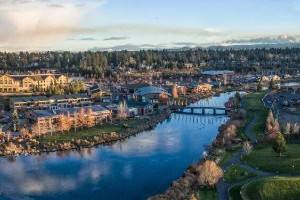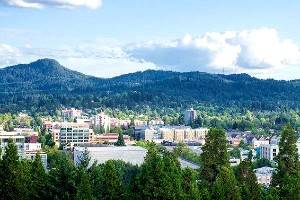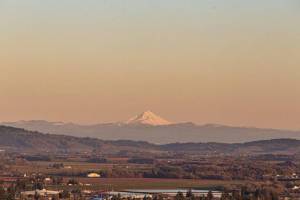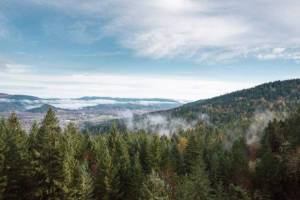Eugene, Oregon at a Glance Guide

Several years ago, the City of Eugene made waves by billing itself "The World’s Greatest City for the Arts and Outdoors.” The public reception was not kind. But maybe the creators of that ill-advised slogan kind of had a point.
Eugene is a great place for the creative and performing arts, and opportunities for outdoor excursions abound. Where else in the country are ski slopes, lush forests, and beaches alike just a short drive away? But being in Eugene isn’t just about having things to do. It’s about the feeling, man.
What’s It Like to Live in Eugene, OR?
Eugene has long been known as a bastion of sixties counterculture. The Oregon Country Fair, held every July for the past 48 years and located just outside the city, is a mecca of free expression. Since marijuana’s legalization in 2015, Oregon’s cannabis scene has gotten its fair share of attention, but really there’s so much more than that to Eugene’s counter-cultural vibes. From activism to spirituality and experimental approaches to community, the spirit of the 60s lives on in Eugene.
Eugenians aren’t just looking backward either, or up into the sky. This is a city full of people who want to make a difference, whether it’s by providing gourmet farm-to-table meals, brewing the perfect IPA, or collaborating with villagers in Senegal to help build a more sustainable future.
Eugene is also a place where people are just living the life—finding love, going to school, raising kids, and working in diverse local industries like technology, environmental services, and higher education.
The University of Oregon, located close to downtown, is the state’s highest-ranked public university, known particularly for its law, journalism, environmental studies and business programs.
Once derelict, the downtown is now thriving. The Whiteaker neighborhood is an especially outsized cultural presence, home to artists, writers, hippies, and plenty of others who just appreciate its unique eateries, breweries, cafes, natural grocery stores, and watering holes. In 2012, Esquire Magazine even named quirky neighborhood standby Sam Bond’s Garage as one of America’s best bars.
We haven’t even mentioned Eugene’s status as “Track Town USA,” nor have we mentioned its miles and miles of bike paths and paved trail along the Willamette River. But we think you get the idea. Eugene is certainly a unique place, but go beyond its reputation as a hippie haven, and you’ll find that there’s a bit of something for anyone who wants to live outside the box.
What’s the Weather Like in Eugene, OR?
Eugene lies in the Marine West Coast climate zone, which translates to relatively mild average weather for most of the year with fairly hot temperatures and dry weather in the summer.
We’re not going to lie – it does rain, particularly in the late fall and winter months, adding up to 47 inches on the year. But from May through early October, precipitation drops off significantly, resulting in some of the loveliest summer weather you’ll find anywhere.
Temperatures in Eugene bottom out in December and January, with average lows of 34 degrees and average highs of 46 degrees. In other words, it doesn’t get cold enough to snow most of the time, and Eugene averages only a couple inches of snowfall per year. In the summer, temperatures rise to average highs in the low 80s, but it still cools off into the low 50s at night.
You can read our full article on Eugene weather here.
What’s the Best Way to Get Around Eugene, OR?
Whether you’re commuting to work, going to school, or working from home and mostly sticking around your neighborhood, Eugene offers multiple viable options for transportation.
What Is Eugene, Oregon Known For?
We’ve covered many of the bullet points already, focusing on Eugene’s unique culture and distinctive vibe. But how did Eugene become what it is today? Let’s start with a brief history lesson.
Eugene was initially settled by the Kalapuya tribe, who may have been in Eugene for as long as 10,000 years. American settlers arrived in the mid-1800s.
These included Eugene Skinner, who erected a cabin on the present-day Skinner’s Butte in 1846. At that point, prior to the construction of dams in mid-1900s, the area was more prone to floods. In 1853, the settlement was named Eugene City, then simply Eugene in 1889.
Eugene’s geography is actually among its most celebrated features. The city is located in the southern Willamette Valley of Western Oregon, situated between the Cascades mountain range to the east and the Coastal mountain range to the west. Eugene’s elevation is 430 feet above sea level.
Eugene is the largest city in Lane County, which stretches all the way from the Pacific Ocean about an hour to the west to the foothills of the Cascades Mountains about an hour east.
Lush old-growth rainforest and scenic rivers can be found in the foothills of both the Coastal and Cascades mountain ranges, and the coast is home to many small lakes and the largest expanse of coastal sand dunes in North America.
The Southern Willamette Valley is renowned for its wineries, many of which are just a short drive north or south and to the west from Eugene. Portland is a two-hour drive to the north along I-5, while the California border is a 3.5 hour drive to the south.
Higher Education
If one were to survey a random group across the country and ask them what they associate with Eugene, one answer is sure to be more popular than any other: the Oregon Ducks.
Donald Duck is the mascot of the University of Oregon’s athletic teams. Eugene is a college town, and sports are a big part of that identity. For the past 20 years, the Ducks have been perennial contenders in football, basketball, and other NCAA sports.
However, the U of O is also Oregon’s highest-ranked public university. It has plenty of renowned academic programs, like law, journalism, environmental science, and business.
Whether you’re a student or a community member, the University offers numerous opportunities to enrich your life. It’s also Eugene’s largest employer. Lane Community College offers more along the same lines, along with plenty of great vocational training opportunities.

Is Eugene, Oregon a Nice Place to Live?
The short answer is “yes,” but as with all things, it depends on what you’re looking for. If it’s a balance between the amenities of a city without the hassles of a larger urban center, Eugene could be right up your alley.
Eugene’s current population is estimated at 175,980, having grown by about 14% since 2010. That makes it the 166th fastest-growing of the nation’s 515 cities.
An estimated 387,599 people live in Eugene’s officially-designated metropolitan area. The criteria for inclusion is questionable: that’s a pretty huge swath of territory, including Springfield, Junction City, Cottage Grove, Creswell, Veneta, Florence, and other small towns. The Eugene metro area proper has less than 250,000 people.
Generally speaking, Eugene’s cultural, culinary, and entertainment options are quite respectable for a city its size. That being said, Eugene can’t really compare on those fronts to larger urban areas like Portland. Eugene is an eclectic place, but depending on what you’re used to, it might start to feel a bit homogenous.
At the same time, being in Eugene means minimal traffic, a relaxed pace of life, and a balance between suburban-style living with easy access to the city center. Eugene has plenty of great, walkable and bikeable neighborhoods. Click here for our Eugene Oregon map and neighborhood guide.
It’s up to you, of course, whether Eugene hits the sweet spot in terms of the urban/rural dichotomy.
We’ve already talked about Eugene’s geographical bounty and its extensive parks and green spaces. The bottom line is simple: there are plenty of factors making Eugene a nice place to live.
What’s the Cost of Living in Eugene, OR?
Needless to say, the key to making your Eugene dreams a reality is being able to afford to live here.
On the whole, Oregon’s cost of living is on the high side. Eugene isn’t the most expensive place to live in Oregon by any means. But it’s also not the cheapest.
The number one culprit is the housing market. Home prices have been climbing all across the country, and Eugene is no exception. But while other markets are starting to cool off, Eugene’s has stayed hot.
The reason? Housing inventory in Eugene is incredibly low. There’s been a decades-long shortage of new construction, and buildable land remains very scarce.
It’s difficult to find a home in Eugene, period. That’s doubly true if you’re looking for a home with contemporary finishes.
Through 2023, Eugene homes sold for a median of $450,000. Mortgage rate hikes are derailing further appreciation, for now, but Eugene’s market is still on a clear trajectory upward.
If Eugene’s residential market is tight, the rental market is even tighter. Expect few choices in any part of town, strong competition, and rapidly-appreciating rents.
An average apartment in Eugene now rents for $1,761, while $2,000-3000 is the new norm for a 3-4 bedroom home.
What is There to Do in Eugene, OR?
Before you think too seriously about relocating to Eugene, you’ll want to pay a visit.
Most likely, you’ll have a full itinerary. There are plenty of things to do in and around Eugene, no matter your interests. Just keep an eye on the weather forecast.
We’ll start with the outdoor stuff, simply because there’s so much of it here. Hiking Skinner’s Butte is practically a rite of passage, and you’ll have a great view of Eugene and its surrounding environs.
While you’re out that way, hit up the Cascades Raptor Center for a great, kid-friendly outing with one of the largest collections of native birds of prey in the Pacific Northwest. You can also head to Clearwater Park or Doris Ranch in neighboring Springfield for an enchanting walk or bike ride along the McKenzie River.
Eugene, as we’ve hinted already, has a serious athletic pedigree. Its star shines bright in the world of track and field. Eugene, in fact, is known as “Track Town U.S.A,” and numerous luminaries have passed through the University of Oregon.
The University’s newly renovated Hayward Field is one of the finest outdoor track facilities in the world. It has been home to the NCAA championship, the U.S. Olympic Trials, and in July 2022, the World Track and Field Championships.
While you’re visiting Hayward Field, you can stop at nearby Pre’s Rock, a memorial to the late and great Steve Prefontaine. Then, of course, there’s Autzen Stadium. If the time of year is right and you’re into college football, you owe it to yourself to catch a game. And don’t forget the Ducks’ brand-new basketball arena, Matthew Knight Arena.
Even if sports and the outdoors aren’t of much interest, there’s plenty to keep you busy in Eugene.
Go on a tour of local breweries like Ninkasi, Oakshire, Coldfire, Wildcraft Cider, and Hop Valley, or pick a direction north, south, or west of town and spend the afternoon visiting local wineries. Sample Pacific Northwest cuisine at some of the area’s many fine eateries, or head to the 5th Street Public Market or Oakway Center for some boutique shopping.
For arts and culture, we have to mention the annual Oregon Bach Festival, one of the world’s premier classical musical festivals. Year-round, the Hult Center features internationally-renowned performers from all manner of performing arts disciplines.
First and last Friday’s art walks downtown are a great way to peruse local galleries while sipping on your favorite beverage. There are plenty of local theater companies, music venues, and several independent cinemas as well.
If history is more your thing, Eugene also has several great museums. The Jordan Schnitzer Art Museum is one of the highlights, with one of the largest collections of East Asian art on the West Coast.
The Museum of Natural and Cultural History is another great pick, also located on the University of Oregon campus. For the kids, the Eugene Science Center is a must-visit.
We’re really only scratching the surface. For more ideas, check out our list of the top things to do in Eugene, Oregon.
In Conclusion
We’ve prepared this guide to give you a small taste of all that Eugene has to offer.
Maybe we’ve helped inspire you to pay a visit, but if the draw to Eugene is potentially deeper, you’ll want to make sure you do all your homework. Relocation is a major endeavor, and it’s important to make use of all the resources you have available.
Simply put, we’re here to be a resource for you. That’s true whether you’re just wondering what it’s like to live here or have more specific questions about the housing market and what it takes to find a home in Eugene.
We hope you’ve enjoyed our At A Glance Guide, and we’re happy to continue the conversation – just press the “Contact Us” button to the right, and we’ll be right in touch.




